
How Many Meals Should You Eat Per Day While Bulking?
Bodybuilders used to think that they needed to eat seven meals per day while bulking. They thought that if they didn’t eat often enough, their bodies would shift into “starvation mode,” which would cause them to gain less muscle and store more body fat. Some of them would even wake up in the middle of the night to have a protein shake.
Now that intermittent fasting is becoming popular, that idea is starting to die out. Instead of eating seven meals per day, it’s common for bodybuilders to experiment with eating as few as 1–2 meals per day. But there’s a problem here, too. Going through periods of fasting slows down our muscle growth. (A couple of new studies also found that fasting can affect our hair.)
The good news about intermittent fasting becoming more popular is that there’s now quite a bit of research comparing different meal frequencies for muscle growth.
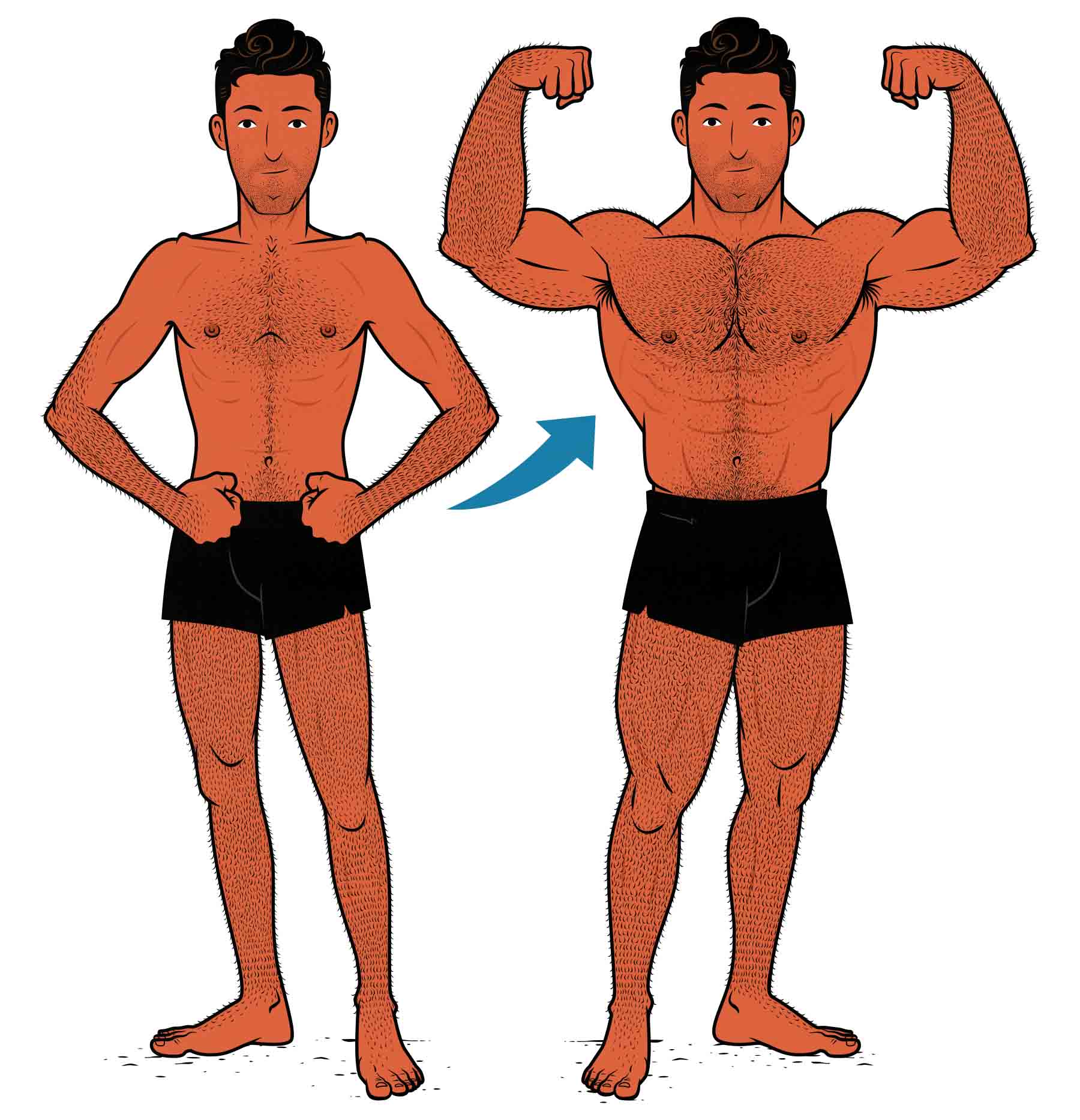
Why Do Bodybuilders Eat So Often?
To bulk up, you need to eat more calories than you burn. And as you start eating more calories, your body shifts into grow-and-spend mode, and your metabolism revs up. Part of that is because you’re gaining muscle and carrying around more weight (full explanation). But eating more food also gives you more energy, improving workout performance and increasing your activity levels.
Naturally skinny guys tend to have especially adaptive metabolisms. When we eat more calories, our bodies store less of the extra energy as fat and instead spend more of the energy on being more active. This can give us surprisingly high metabolisms, especially when we’re trying to gain weight. It can also allow us to bulk quite leanly:
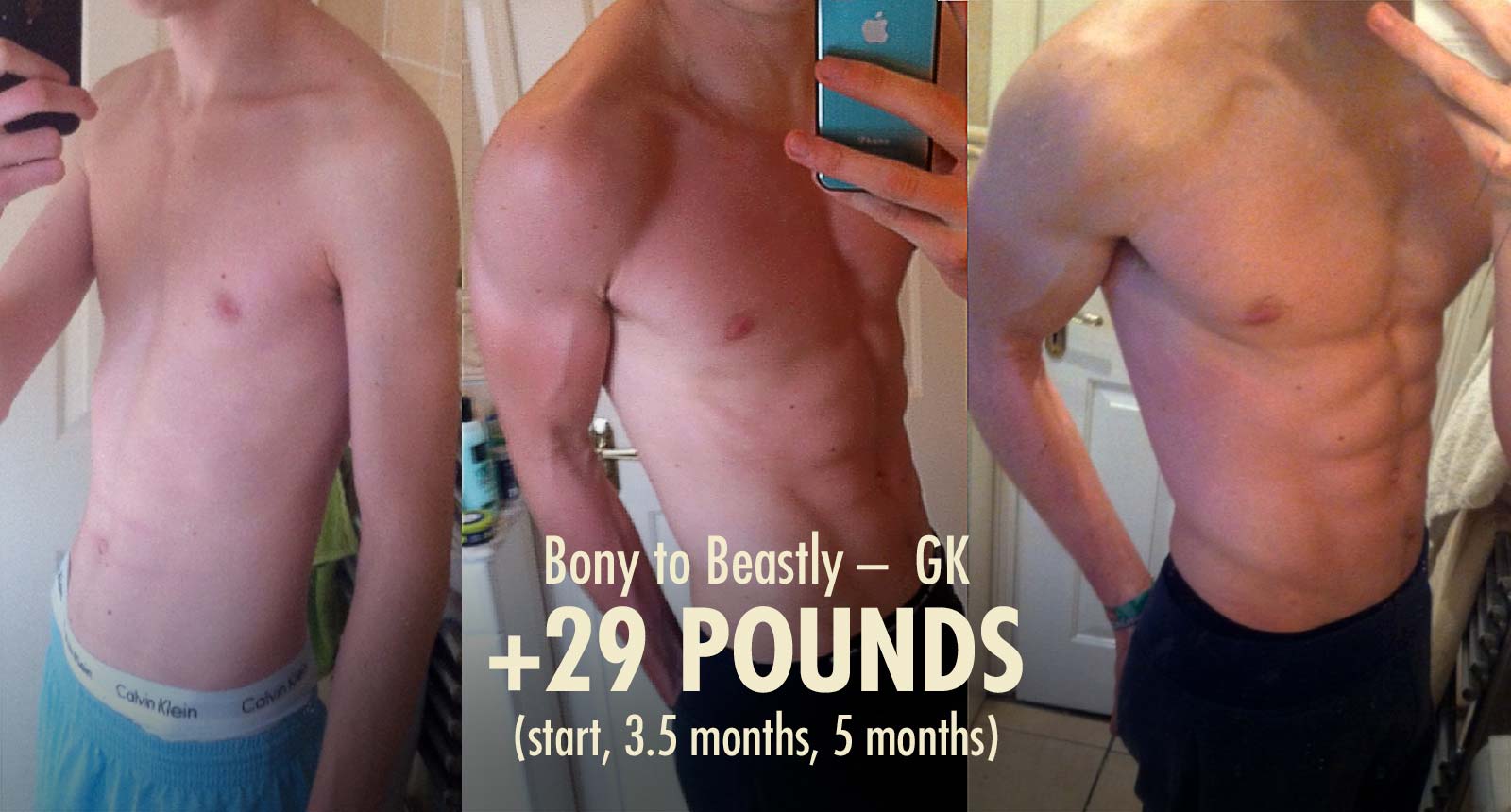
But the point is, eating enough calories to gain weight can be hard, especially for big bodybuilders carrying around a ton of muscle mass, and especially for naturally skinny guys with fast metabolisms.
The main reason bodybuilders eat so often is that it makes it easier to eat more calories. The more often you eat, the smaller your meals need to be, and so the less likely you are to feel hot, sluggish, and tired afterwards. You’re also less likely to run into digestive problems like acid reflux.
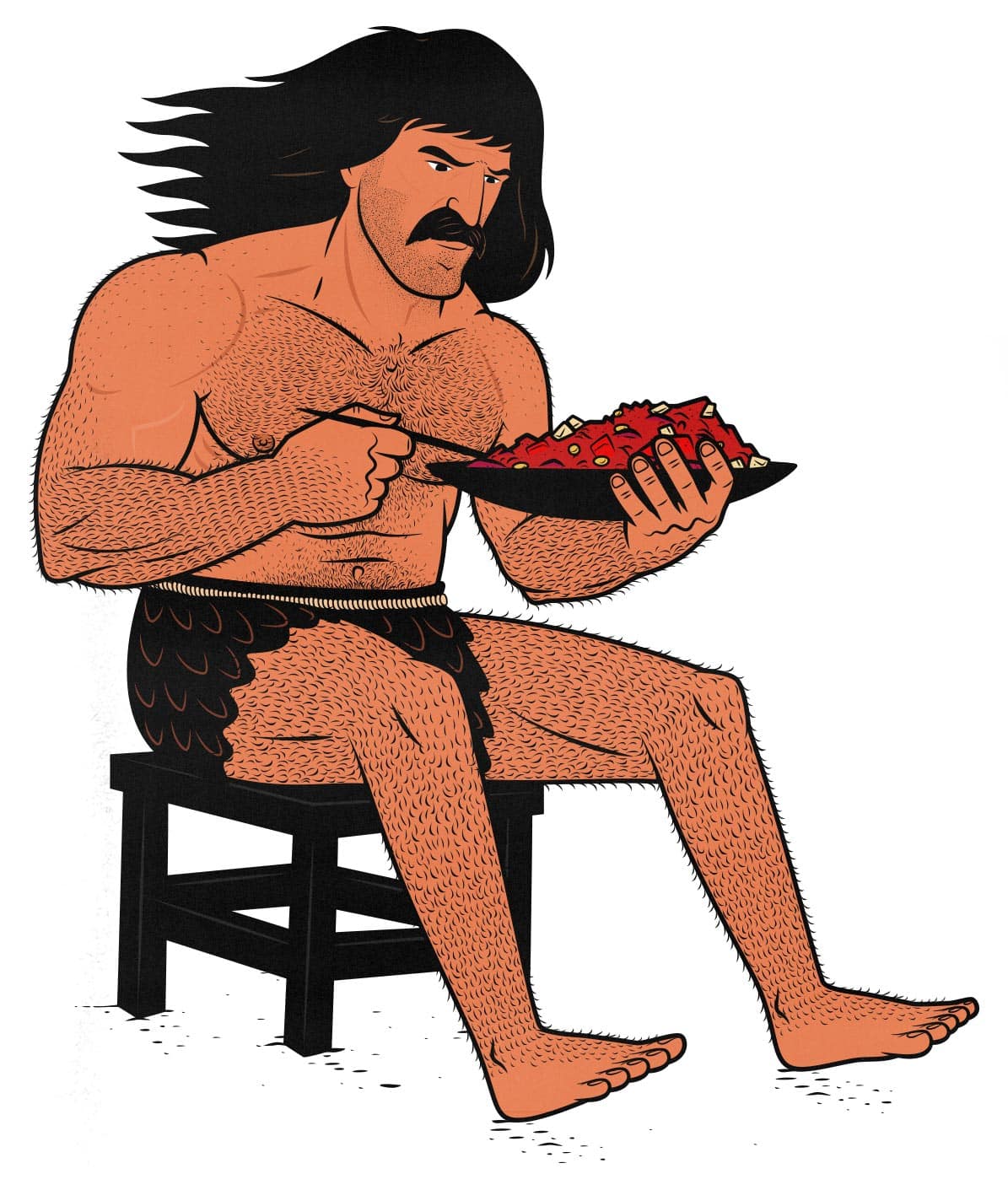
If you have a big stomach and a big appetite, you can get away with eating less often. But the fewer meals you eat, and the smaller your eating window gets, the harder it becomes to get your calories and protein in.
If you restrict your eating window too much, it probably starts to impair muscle growth a little bit (meta, study, study). And if you’re building muscle more slowly but keeping eating the same amount, then you’re more likely to gain fat. You can still build muscle while intermittent fasting, but it’s not quite ideal, especially if you’re naturally skinny (research breakdown).
As a naturally skinny guy who’s trying to bulk up, you may find that eating 3–6 meals (or snacks) per day works better for you. After all, skinny guys tend to have smaller appetites, smaller stomachs, and higher metabolisms. Eating like hobbits often suits us well.
Will Eating More Often Reduce Fat Gain While Bulking?
Let’s start by quickly going over how meal frequency affects muscle growth and fat gain while bulking:
- Eating more calories increases your metabolism, but meal frequency doesn’t really matter. If you eat small meals more often, your metabolism will go up by small amounts more often. If you eat big meals less frequently, then your metabolism will increase by larger amounts less frequently. So, as long as the type and amount of food eaten is the same overall, so is your metabolic response.
- Muscle catabolism (i.e. your muscles getting smaller) doesn’t begin until several days after your previous meal. As long as you stimulate your muscles with a couple of workouts per week(or more), fasting is unlikely to cause much muscle loss. Muscle growth turns off during longer fasts, though. Long fasts aren’t a good bulking strategy.
- Healthy bodies are incredibly good at maintaining proper blood sugar levels. That’s true whether you eat a bunch of small meals or a couple of bigger ones.
- Your body doesn’t need a steady drip of protein. Even just one meal can be enough to give your body the protein it needs for the day. Whey protein isolate digests at a bit more than 10g/h, so 30g of whey would take 3-4 hours to digest. If you get your protein from meat or casein, it would take more like ten hours to digest. Most protein sources fall somewhere in the middle (study). So even if you aren’t eating very often, your body has a fairly steady supply of protein.
- Is starvation mode real? There are a few things going on here. Your body probably won’t do much growing when you aren’t eating. So, if you’re trying to maximize muscle growth, then it does help to eat at least 3 meals per day. But eating less often won’t harm your metabolism or cause you to store extra fat.
How Many Meals Should You Eat Per Day?
If you have a big stomach and a robust digestive system, you might be able to get away with eating 1–2 meals per day. But if you want to fully maximize your rate of muscle growth, or if you find it hard to eat enough calories while bulking, try this:
- Eat breakfast shortly after waking up. If you wake up without an appetite, have a simple protein shake. I’ve got my favourite breakfast recipes here (including my favourite protein shake recipe).
- Eat at least a couple of meals or snacks throughout the day. Some of these meals can be really light and simple, like a handful of trail mix with a glass of milk. You don’t need to cook up a bunch of meals or waste a bunch of time eating. Here are some of my favourite bulking meals.
- Eat a small snack right before bed. If you fall behind on calories, you might need to eat a big meal before bed, but I would avoid it when you can. When you eat, your body produces heat as a byproduct of digestion, making you feel hot. That extra heat can make it hard to fall into a restful slumber. Lying down after a big meal can also trigger acid reflux.
- Stick to the same schedule every day. Nothing terrible will happen if you miss a meal, but your body prefers routine. It likes to rev up your hunger when it knows a meal is coming. It likes to prepare digestive enzymes ahead of time. Your digestive system will run much more smoothly if you let it plan ahead.
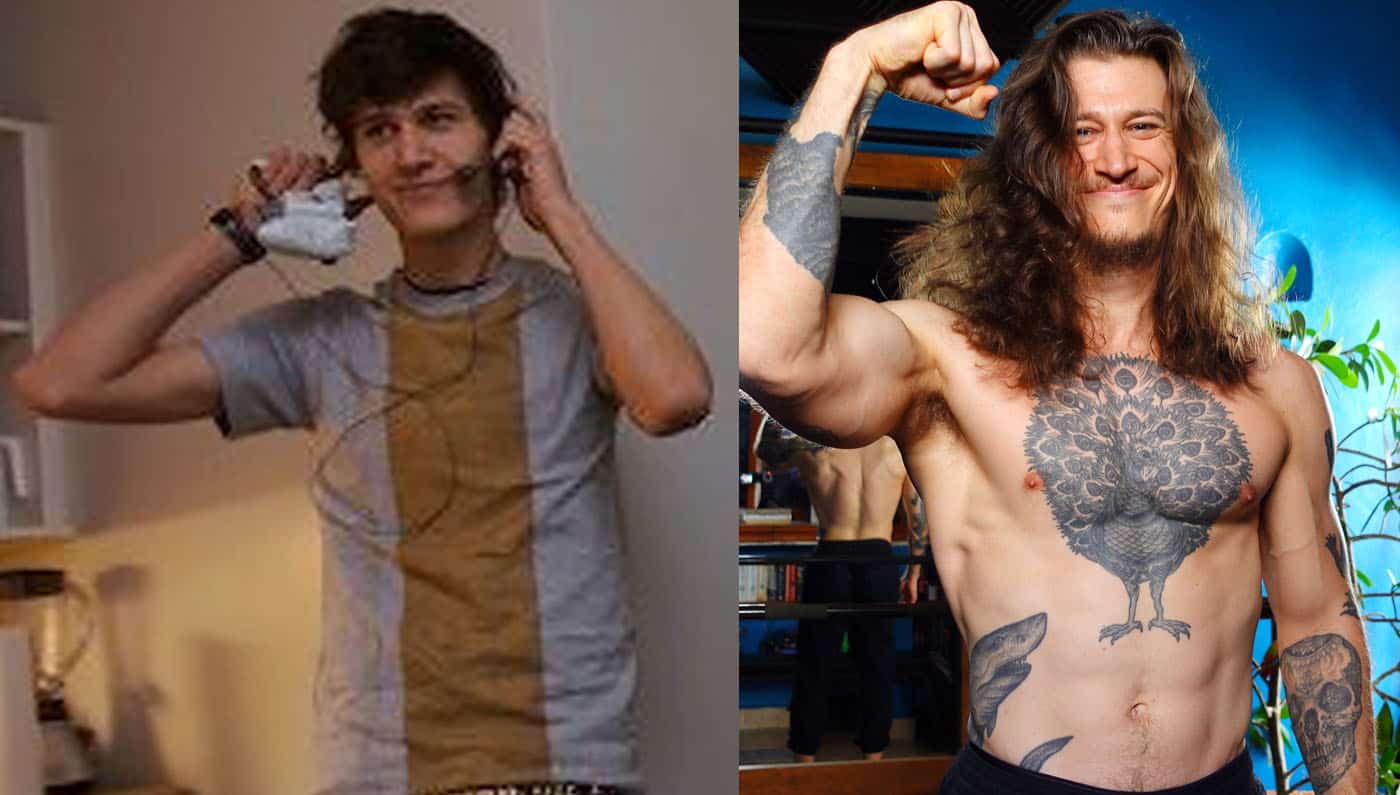
I gained 75 pounds from eating 4–5 meals per day, starting with a very light shake right after waking up. During the day, I’d eat a couple of snacks and a moderately-sized lunch and dinner. Then, right before bed, I’d have a light snack. I’ve got my favourite meal plan here.
If you want more, we have a full nutrition guide and recipe book included with our Bony to Beastly Bulking Program and Legends: Health & Aesthetics Program. We’ve got more breakfast recipes (like a homemade protein bar you can prep in bulk), and we’ve also got a bunch of great options for lunch and dinner, including our favourite meal-prep meals (where you cook a dozen servings at once).

We take this stuff seriously. We aren’t just trying to give you generically healthy bulking meals, we’re trying to give you enough of every macronutrient and micronutrient you need to build muscle, burn fat, improve your health, enhance your appearance, and maximize your performance.
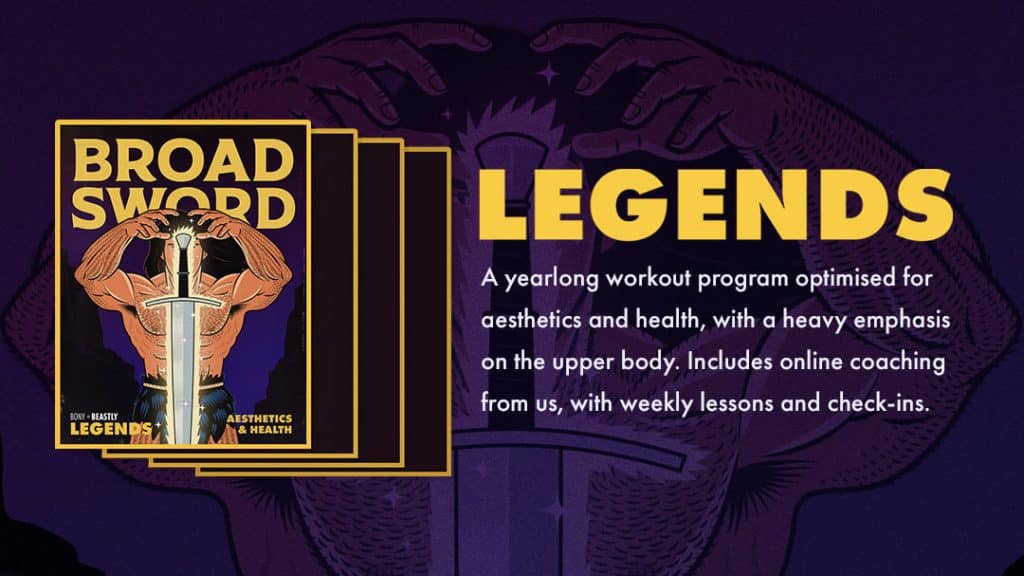
We can help you eat a great diet, whether you like intermittent fasting, low-carb, eat a plant-based diet, or have digestive issues (like IBD or GERD). Our nutrition guide and recipe book are great places to start, but both of these programs also come with one-on-one support in our online coaching community.
Alright, that’s it for now. Feel free to drop a comment if you have any questions.
Muscle-Building Mini-Course via EMAIL
Sign up for our 5-part muscle-building mini-course that covers everything you need to know about:
- Hardgainer genetics and how to make the most of them.
- How to take a minimalist approach to building muscle while still getting great results.
- What you need to know about aesthetics, health and strength while muscling up.


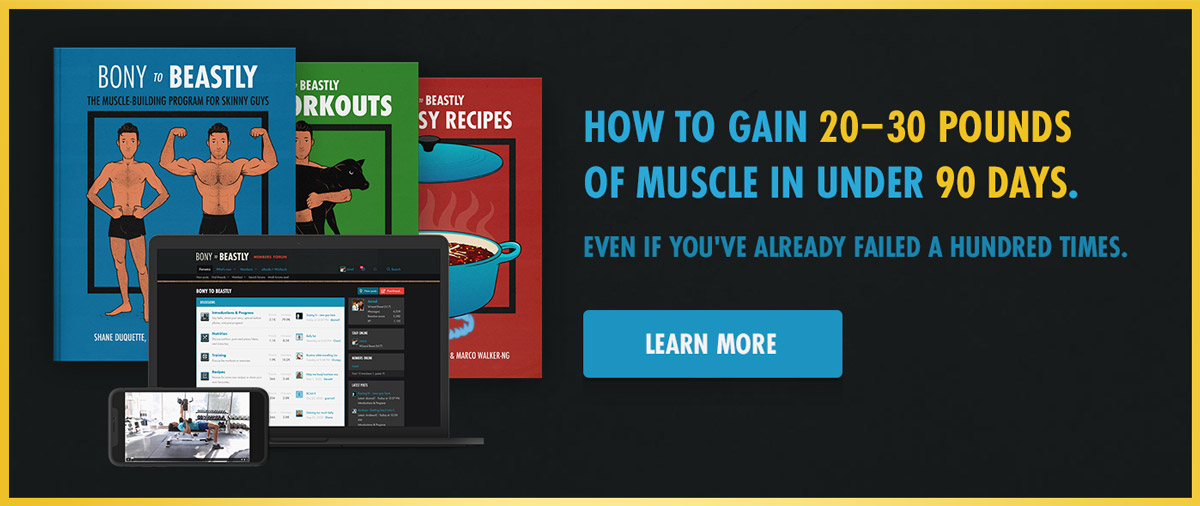
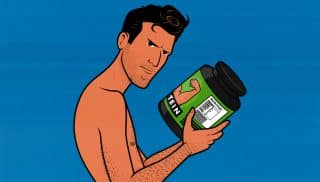
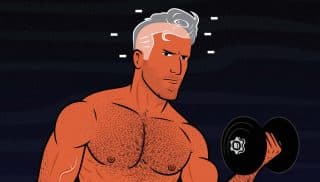

Getting two meals and a snack together in the mornings, and carrying them with me to work is getting results, but if this does too, it could seriously simplify things for my schedule! Haha.
Definitely gonna try this one out. Thanks for the tip!
Do you ever notice guys in the gym who go just about everyday with high-intensity weightlifting (or so it seems)? And do you ever notice that these guys never gain weight? Its because their nutrition is sub-par. Sub-par in the “2-meals-a-day” sense… The breakdown and rebuilding process will never progressively support full-potential gains without exceeding your body’s average sustainable caloric intake, consistent dosages of protein, healthy testosterone levels, and basic nutritional maintenance. Im a body builder myself, and believe me, nutrition is 95% of the battle… It shouldn’t be played off as anything less. The rate of muscle building is actually completely reliant upon the person’s ability to feed themselves the right foods and in the right amounts, which is about every hour and a half. You got it wrong. Your looking at the body’s ability to survive as opposed to the body’s ability to thrive. Yes the body will survive a long time without food, but only if its not building muscle. If its building muscle, it uses up protein you feed it very quickly (like I said, about an hour and a half), and then it needs more to continue building. Your crazy if you think 40 grams of protein is going to last half a day during the rebuilding process. False information. Eat often, healthy, and in conservative amounts throughout the day and you will double your gains bro. Trust me.
Ah right on. I love having our articles challenged—keeps us on our toes!
I absolutely agree with you about feeding your body the nutrients that it needs to thrive, and of course to gain the most muscle possible you’d want to be eating at a nice calorie surplus. You don’t need to eat OFTEN to do it though. Four 1000 calorie meals will get you just as far as eight 500 calorie meals, as you’d be consuming 4000 calories of the same nutrients either way.
It sounds like with your frequent protein intake you’re talking about maximizing muscle protein synthesis (MPS)? With that in mind you would want to consume protein (ideally high in leucine/BCAAs) relatively regularly due to the refractory nature of MPS … but you’d max out on your anabolic muscle-building benefits eating just once every 4-6 hours. More than that is fine, but not any better.
Eating three times a day has consistently proven to be just as effective as eating more frequently when the quality and quantity of the nutrients are matched. Eating frequently is always an option though, and it works great!
If you’d like to contest this I welcome the challenge. We aren’t trying to push an ideal here, just share the most accurate information that we can.
This guy doesnt know his stuff…there are only 21 amino acids, 9 of which are essential, the other 12 can be produced by the 9 essential but the essential amino acids can not be created by the body as a source of energy or to build muscle, they must be ingested. Also, blood sugar is effected before 48 hours. If you take your blood sugar after a meal and then twelve hours later you take it again there will be a significant difference in level. I agree with the overall point youre trying to make in the article but your info is just drawn from a hat of imaginary knowledge…i think muscle growth can happen with eating only a few times a day but your points to prove that are inaccurate.
Wrong.Testosteron drops down everytime we eat(and HGH).Our body can take only what it can take.All the rest is waste of money and hormons disbalance.It can lead to serious health problems.Eat normally and train optimally.
Yea, I pretty much agree with your analysis. Eating frequent meals is a bodybuilding culture myth promoted by guys on roids. Fact is, you can make all sorts of radical gains on roids regardless of what rediculous rituals you follow.
Eating all throughout the day sucks and can be downright antisocial at times. What really matters is the training…then nutrition, sleep, fresh air, sunshine etc…
If you’re not progressing in terms of muscle mass development, it’s probably a training, nutrition or rest issue. Not some silly eating ritual. Some studies have shown that being in a constant fed state actually hinders your body’s ability to produce HGH and raises cortisol.
I guarantee that our ancestors weren’t running around on full bellies all day, and we’ve evolved accordingly.
Great stuff here. It is nice to find voices of reason in the ocean of BS and dogma that is the internet.
I think the 6 meals a day thing proves to be totally impractical for most folks and because it is often presented as a must for diet success, people just quit.
On a side note, I think it is also one of the bigger contributors to the plethora of over fat people around these days. The size of a meal, if you eat six a day to lose weight, is so small for most people that it is just a tease.
Ahaha “a tease” – yeah you’re right. I’ve always found it easiest to reduce calories by reducing the number of meals I eat, not the size of the meals that I eat. I enjoy eating to satiety (if not fullness) but find it very very easy and enjoyable to not eat as often!
When bulking you’re right – it’s so much more practical to eat bigger meals! Otherwise you could easily spend half your day eating. Not bad if you’ve got an easygoing schedule and love to eat, but not the best for productivity or compliance!
Marry me.
Hi there,
Do you know anything about intermittent fasting “IF” ?
It said that, with “IF” we can boost our Growth Hormone 2000 % on male.
With this hormone we can burn our fat and gain more muscle.
When people say that ectomorphs should eat more like a beast, but this method is saying the opposite..
What is your opinion about this ? Have you ever tried this method ?
Thanks bro..
Hey Alex, for sure! I find the research into intermittent fasting fascinating, and I’ve experimented with multiple forms of it many times!
The effects of playing with meal timing (e.g. intermittent fasting) are fairly mild when compared with the effects of the quantity and quality of the food you eat … so keep in mind that this is largely a personal preference thing.
For chubbier guys who struggle when trying to consume fewer calories, intermittent fasting is a great strategy as it reduces the number of meals instead of the size of the meals. Depending on their preference, this can be pretty sweet! Lots of guys enjoy eating really large meals, so it works well.
Intermittent fasting for us ectomorphs is a bit of a different story.
… but keep in mind that we aren’t saying the opposite at all! Intermittent fasting is saying that you can get great results even if you eat fewer meals, so long as the quantity and quality of the food that you eat is good.
What we’re saying is that we don’t care how many meals you eat or when you eat them so long as you eat the quantity and quality of foods that you need to build muscle.
Ours follows the same physiological principles … it’s just a little less strict.
Here’s why things are different for ectomorphs when it comes to intermittent fasting:
Intermittent fasting won’t make you grow unless you also eat like a beast.
Eating like a beast is hard enough already for an ectomorph without also reducing the feeding window.
The whole “point” of intermittent fasting is to find an enjoyable and effective way for naturally big/hungry guys to consume FEWER calories so that they can lose weight and thus be lean and muscular.
The whole point of bony to beastly is to find an enjoyable and effective way for naturally skinny guys to consume MORE calories so that we can GAIN weight and thus be lean and muscular.
As for growth hormone, yes, there are advantages with intermittent fasting. Enough of an advantage for it to make a noticeable difference? I don’t know. We’ll have to way to see how the studies pan out as time goes on. As things stand now the effect is very very mild when it comes to the difference in muscle you can build … so it’s not really worth worrying about.
It IS worth experimenting with for fun though, and I’ll certainly be keeping my eyes on things to see how we can leverage the benefits for us ectomorphs! 🙂
Does that help?
They say eat like a caveman. Caveman doesnt eat 9 times a day. He only eats when his hungry. 😉
I must say I enjoyed the article and am impressed with the amount of research done in order to reach the conclusion. I’m a mesomorph (with slightly endomorphic tendencies in terms of diet) and have found that a high number of meals a day is the best plan for me, regardless of the goal. This, however, is only because it keeps me feeling full all day. It feels less like a change to my diet when my calories are spaced out over 2-3 hour increments. I have numerous ectomorphic friends who have had great success in terms of muscle gain when following a similar plan, but I have just as many who have had great results with a traditional 3 meals a day plan. That being said, I was wondering if you had experimented any with the (sort of) new theory of absolute failure when it comes to weight training. I have read and heard of people experiencing drastic strength (and in time) muscle gains when loading up weight 20-25% higher than their ORM, and doing a negative movement followed by 15-20 seconds of struggle. Supposedly this causes an “evolutionary switch” to trigger, in effect causing crazy muscle growth and strength gain. This would be a once a week exercise.
Hey Nathan, sort of a HIT approach to training? It seems to work well for some outliers (everyone is a little different). For most people you’ll see much better results if you limit muscle damage by shying away from failure, allowing your muscles to recover more quickly, and thus allowing you to train those muscle groups more frequently. That seems to yield optimal results.
That HIT approach of going to absolute failure (and even beyond) can indeed work, and surprisingly well given how little time it takes, but unless you’re very short on time and optimizing your plan for efficiency over results, you’d want to take a more classic approach where you use a higher frequency.
(Higher frequency / avoiding failure is also better for some secondary reasons as well, like allowing you to practice your lifting technique more frequently and thus building up better proficiency at the lifts, it wouldn’t bring you to a point of fatigue where your form is likely to degrade and you’d get injured, etc.)
hello KARTHIK here, I wanted to ask you that whenever we eat protein fat and vitamin stuffs does its really transforms into a muscular body or else what is the problem of indigestion deals with it.. does it leads to reduction of muscles…
Hey Karthik, are you asking if indigestion prevents you from using those nutrients to build muscle? It would, to a limited extent. If you can’t digest those nutrients then they won’t contribute to building muscle… but presumably you’d still digest the other nutrients in the meals you’re eating even with a bit of indigestion. Still, best to avoid the foods that give you indigestion. (And this may be something to discuss with your doctor if it’s an ongoing problem!)
I hope that helps 🙂
Nice one. Youve really eased my stress with that post. Two meals a day? Looking good, keep it up and thanks for sharing.
I am an ectomorph myself and have been eating six meals a day including one protein shake with peanut butter and half a banana. I eat a large meal for breakfast and a carb filled one before and after my workouts. I am gaining muscle but not nearly as much as I should be. Anything I can do about this? If I were to eat Taco Bell everyday 3 times a day I’d gain weight but eating super clean the way I do even with high protein levels is not stacking on the muscle. Help! I am doing my first N.P.C Bikini show this July and would like to grow a booty and some shoulders.
Hey Lindsay. First of all, you may dig our muscle-building site for naturally thin women: Bony to Bombshell. Your question is a good one for this site too though.
It sounds like your approach to nutrition is solid. You’re eating often, you’re eating enough protein, you’ve got some carbs surrounding your workouts (although really loading up on the carbs is more of a guy thing, as more estrogen causes less glycogen retention).
I would just say that somewhere between the two extremes is probably ideal. You don’t need to eat totally clean when trying to bulk up and add a lot of muscle mass. But you also shouldn’t eat a diet made up of total junk either, or you’ll gain fat instead of muscle. Try to get around 80% of your calories from whole foods, 20% from treats, supplements, ketchup and whatever else. Choose whole foods that you really enjoy too—the whole diet should be as enjoyable as possible.
Also make sure to keep your calories in check. One of the reasons that junk food is so fattening is that people go way overboard with the calories. Let’s say you need 2,100 calories per day to grow. Right now you’re consuming a maintenance diet and eating clean—perhaps around 1,700 calories. Adding in a 400 calorie dessert every day would still leave you eating 80% of your calories from whole foods and may allow you to gain leanly at a moderate pace (maybe 0.5 pounds per week). If you switched to Taco Bell three times per day though you may accidentally bump your calories all the way up to, say, 3,000 per day. In that case, in addition to your half-pound of muscle, you might be adding on a pound or so of fat every week simply from the calorie onslaught.
So feel free to dirty up your diet a little. (Or use other appetite tricks.) But don’t go full fast food.
I hope that helps!
Very good read and an interesting but clearly effective approach to a muscle building diet!
I also run a muscle building blog and it would be awesome to collaborate on something in the future!
While the 4+ meals/day while cutting is totally unnecessary, it helps on a bulk. The reason is you want your insulin levels up for as much of the day as possible. Insulin is very anabolic and promotes muscle growth and your insulin levels drop back down 4-6 hours after the carb consumption, so you will gain less muscle if you don’t spread carbs throughout the day. Also spreading protein throughout the day at least 4 different times bulking reduces the likelihood that the proteins will be converted into glycogen. However, this stuff is not necessary for 98% of gym-goers, because it only makes a real difference if you are trying to get to or near your genetic potential.
As a mesomorph myself, I found your article in Google when researching meal frequency and was curious if you can link any research or testimonials on using intermittent fasting (IF) with bodybuilding?
I’m trying the 6 meal a day plan, hitting the gym 4 days a week split training (daily 7 exercises, 5 sets, 12 reps etc) but as I’m a bit overweight I need to do cutting.
Eating the traditional 6 meals a day, even in small portions, doesn’t seem to be super effective as a mesomorph. Intermittent fasting looks like a good fit, but weight lifting you’ll want to hit that carb and protein afterwards, too.
I work out every morning and am thinking maybe fasting after 1 pm, 17-hour fast until 8:00 am when I get home from the gym. And eating 8am, then at 12 pm or 1 pm.
What do you think?
Hey Trevor, we’ve got a separate article on intermittent fasting for building muscle. Long story short, intermittent fasting isn’t ideal for bulking up. With that said, you’re trying to cut, not bulk. Your main goal is burning fat, not building muscle. That changes things.
When cutting, intermittent fasting seems to be fine. Some studies show better results, others show worse results. Overall, the results seem to be about the same. So it all comes down to personal preference. If skipping meals makes it easier to eat fewer calories, go for it.
Most people prefer skipping breakfast rather than skipping dinner. They find that it helps them get better sleep. That way they aren’t trying to sleep while feeling the effects of being in a big calorie deficit. But if that schedule works for you, no problem. Again, it’s more about personal preference 🙂